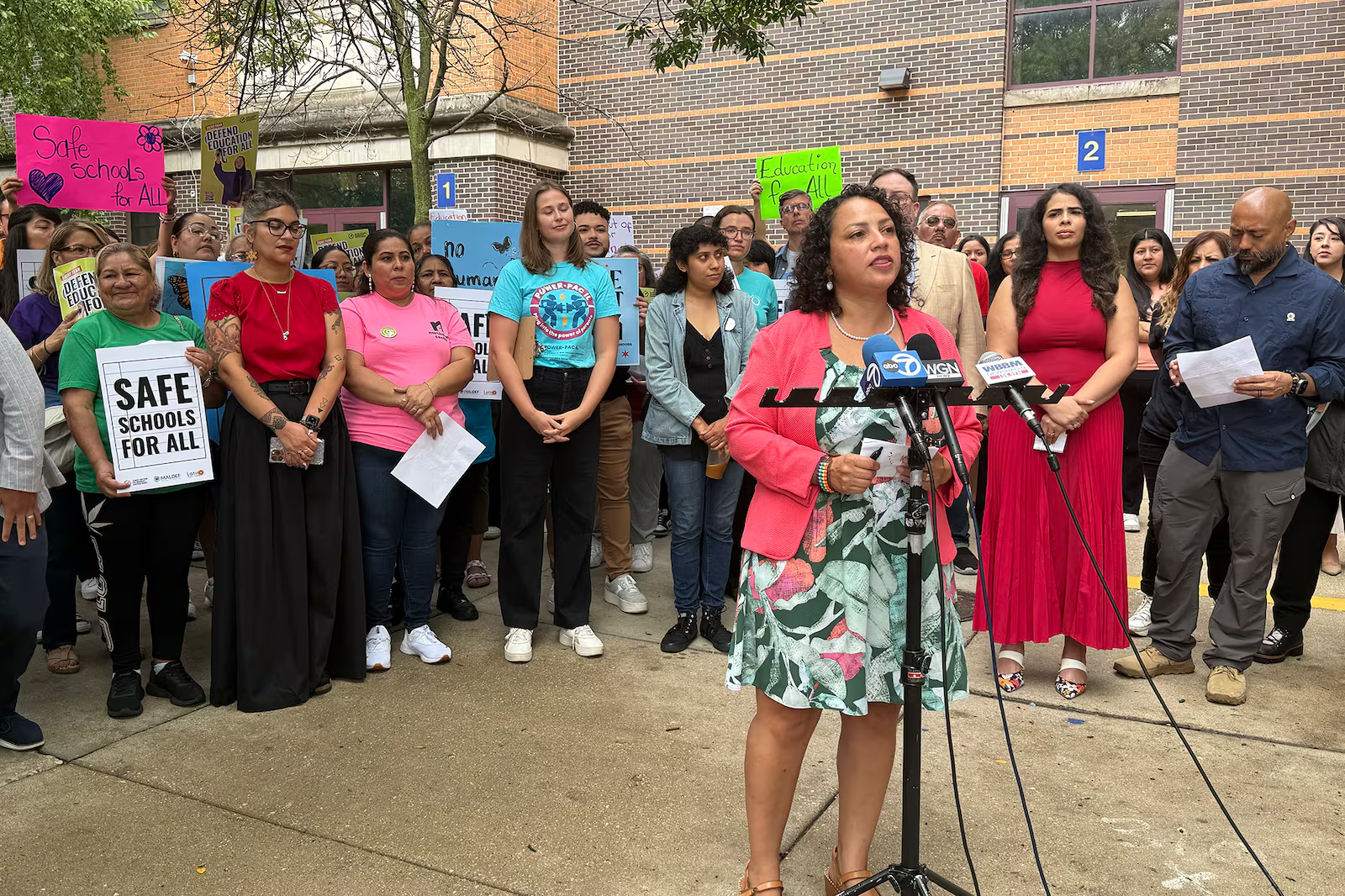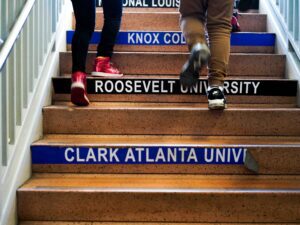 Reema Amin / Chalkbeat
Reema Amin / ChalkbeatThe new law prohibits schools from creating policies that would discourage kids from attending school, such as asking for immigration status.
This article was originally published by Chalkbeat. Sign up for Chalkbeat Chicago’s free daily newsletter to keep up with the latest education news.
Illinois state legislators and immigrant advocates gathered outside a Chicago elementary school on Tuesday to celebrate a new state law meant to enshrine a child’s right to public schools regardless of their immigration status, a step they said is necessary in the face of the Trump administration’s aggressive immigration enforcement.
The law, known as the Safe Schools For All Act, also pushes school districts to adopt policies outlining how schools should respond if federal immigration agents come to a campus. The law, passed at the end of May and signed by Gov. JB Pritzker last week, goes into effect Jan. 1, 2026.
Roughly 100 people flanked elected officials and supporters of the law during a press conference held outside Lloyd Elementary School in the Belmont Cragin neighborhood, which is home to many working class immigrant families. Some held signs that said “Education Not Deportation” and “ICE out of Chi,” referring to U.S. Immigration and Customs Enforcement. Young students occasionally passed by a second-floor window at the school and looked down at the press conference.
News that puts power under the spotlight and communities at the center.
Sign up for our free newsletter and get updates twice a week.
“Parents have always counted on the supports from our principals and our teachers here at Lloyd; they protected our kids and made them feel safe,” Maria, a parent of a third grader at Lloyd who did not share her last name, told reporters in Spanish. “But now all of our communities are able to see that their schools and their families are protected, as they should be, from ICE.”
The new law says all children have the right to a free, public education regardless of their immigration status, effectively codifying the protections established in a 1982 Supreme Court case, known as Plyler V. Doe. Other states have taken the opposite approach, such as in Tennessee, where lawmakers attempted to allow school districts to ban undocumented children from attending public schools.
Advocates said it’s a “first-of-its-kind” state law because it also prevents schools from adopting policies that have a “chilling effect” that could discourage kids from attending school.
Read More of Our Coverage
In addition to the education provisions, the new law prohibits schools from adopting policies that could exclude or discourage students from attendance, such as requesting immigration status or a Social Security number. It also requires schools to adopt policies for how to handle immigration agents who show up to schools, including provisions around reviewing warrants or other documentation the agents might have.
Chicago Public Schools requires staff to contact district law department staff if immigration agents show up to a school, and staff is told not to let such agents enter without having a judicial warrant. The previous Chicago Teachers Union contract also codifies those policies, including prohibiting staff from asking for a student’s immigration status. A copy of the new contract is not on the union’s website, but union leaders have said that the new contract keeps those provisions.
The Illinois State Board of Education provided districts with guidance on what to do as the U.S. Department of Homeland Security and other federal agencies increase arrests or other actions near schools. This was announced in a weekly message by State Superintendent Tony Sanders earlier this year.
The law signed last week drew some opposition while it was being debated in the legislature, including from sheriff’s departments, as well as the Illinois Association of School Boards. The IASB took issue with a provision of the law that allows people to sue school districts if they feel their rights were violated.
“The potential increased risk of litigation and new financial liabilities for school districts was the basis for IASB’s opposition,” the association wrote in its end-of-session report.
Lawmakers felt it was important to require all districts to draft policies that comply with the new law, said State Rep. Lilian Jimenez, one of the main sponsors of the bill.
“People thought, ‘Oh immigration is too confusing. If somebody comes to our school, what do we do?’” Jimenez said. “Well you create a policy, and you all train on the policy and everybody knows what to do.”
Jimenez and State Sen. Karina Villa, another bill sponsor, said during the press conference that they introduced the measure after President Donald Trump’s calls for mass deportations.
Just a few days after Trump’s second inauguration, the administration rescinded the federal “sensitive location” policy, clearing the way for Immigration and Customs Enforcement agents, known as ICE, to make arrests at places like schools, child care centers, hospitals, and churches. Federal immigration agents then arrested about 100 people in the city and suburbs in January.
In February, ICE arrested a father who was dropping his children off to school in Gage Park on the Southwest Side.
In the winter, some parents decided to keep their children out of schools, and attendance dipped even as school administrators tried to support families and train staff on immigration protections. Local advocacy groups stepped up to provide support and ‘Know Your Rights” training to students.
State lawmakers drafted this legislation with the help of immigrant and bilingual education advocacy organizations, including the Latino Policy Forum, Mexican American Legal Defense and Educational Fund, or MALDEF, and the Illinois Coalition for Immigrant and Refugee Rights, or ICIRR.
Even if the U.S. Supreme Court were to overturn Plyler V. Doe, states like Illinois “would still be within their rights to enact their own policies” — and that’s what the new law does, said Fred Tsao, senior policy counsel for ICIRR.
Reema Amin is a reporter covering Chicago Public Schools. Contact Reema at [email protected].
Samantha Smylie is the state education reporter for Chalkbeat Chicago covering school districts across the state, legislation, special education and the state board of education. Contact Samantha at s[email protected].


